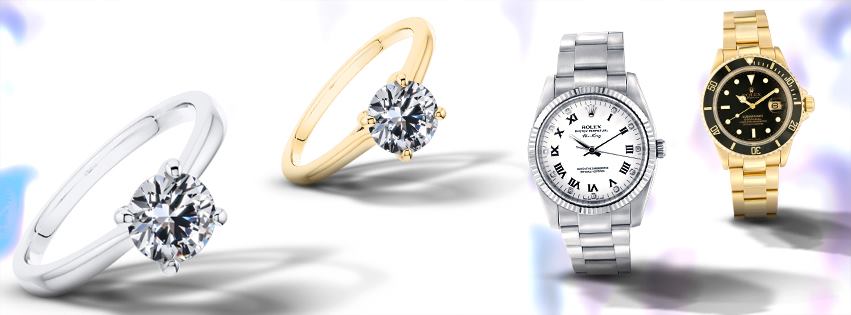
If you’ve been following the diamond industry closely – you may have come across a new player in town, moissanite. It is a gemstone made out of naturally occurring silicon carbide, very rare to find, and today is almost exclusively a lab-grown gemstone. While almost impossible to compete with the clarity of a natural diamond, moissanite gemstones are becoming a popular alternative to the traditional diamond, with many attractive reasons for choosing them. According to the industry experts at GIA, moissanite is officially the closest imitation of a diamond.
A brief history of moissanite:

Moissanite is a gemstone named after French scientist Henry Moissan. In 1893 Moissan was conducting field research in Diablo Canyon, Arizona, when he discovered some crystals. He initially thought he had discovered diamonds. However, it would be 11 years later, in 1904, that he identified the crystals as formed of silicon carbide. Two years later, Moissan won the Nobel Peace Prize for Chemistry. Moissanite is a very rare mineral which means that it is almost exclusively lab grown today.
The differences between diamonds and moissanite: Strength:
As we know, diamonds are popular not only because of how they look but also because they last. In 1822, German geologist and mineralogist Friedrich Mohs created a scale of mineral hardness ranging from 1 as the weakest to 10 as the hardest. Diamonds and carbanado (known as a black diamond) were the only two minerals to rank at the level of 10. However, moissanite performs very well on the MOH scale of hardness, ranking at 9.5-10, very close to diamond.
With diamonds known to be very resistant to scratches and abrasions, it’s important that any alternative should have similar properties and as we’ve seen on the MOH scale, moissanite fits the bill. While not as scratch resistant as diamond – it is very very close.
Moissanite vs diamond price: Why is moissanite so much cheaper than diamond?
Buying a ring with a moissanite gemstone is significantly cheaper than diamond. For example, if you were purchasing a one-carat diamond that costs £3000, you could very likely find the same size gemstone in moissanite for £1000.
Simply put – market factors. The fabled diamond is protected by an allure. Do you want to buy the best? Then you would think of something premium and of the highest quality – diamonds. The demand, the industry, the marketing – they are all factors in the high cost of diamond rings.
The majority of newly engaged couples are still choosing diamonds – which is one reason why there is unlikely to be a dramatic decrease in prices. With that – it means other types of stones are less in demand, and will naturally have lower prices.
Brilliance: How the light reflects off the internal part of the stone
When light reflects off a diamond stone, the appearance is whitish, whereas the reflection off a moissanite stone is a dazzling array of colours. This is because a moissanite gemstone has more fire (the reflection of coloured light). Along with moissanite having more brilliance than diamonds, and being cut in a way to maximise the sparkle, all results in a greater sparkle compared to diamonds.
When all’s said and done – diamonds have a more subtle brilliance. For some, the dazzling colour reflection of a moissanite gem may be a little too intense.
Colour:
Diamonds come in a whole variety of colours, including pink, yellow, blue, green, though many prefer a near colourless diamond. Moissanite stones often have a tint of green or yellow in the stone. And because maisonette is being lab-grown – technology is progressing and colourless Moissanite stones are becoming more widely available
Value:
A diamond stone is considered a long term investment. They are expensive and purchased with the intention to last a lifetime. Moissanite costs significantly less, which means that the monetary value will always be significantly lower than diamonds.
The ethics of lab-grown vs mined diamonds and gemstones:
Although the diamond industry has come a very long way in rooting out conflict diamonds, with moissanite stones being exclusively lab grown – it means that you don’t need to second guess about the ethical considerations in your purchase decision. That said, when you purchase a GIA certified diamond – it will come with a certificate stating the origin of the stone – so you can be certain that it is a conflict-free diamond. Our advice is to always purchase diamonds from a reputable jeweller.
Should I buy a Moissanite ring?
As we have discovered, Moissanite is a very impressive gemstone and a great option for those looking for a cheaper alternative to diamond rings. However, the majority of people still believe that nothing beats the classic diamond ring and when it comes to a lifetime commitment, a diamond is in a different league.
As diamond ring specialists, we at David Ashley pride ourselves in helping you to find the perfect diamond engagement ring to suit your budget.
The future of moissanite rings and jewellery:
The success of moissanite will have a lot to do with demand and attitudes with ring buying. The opinion that really matters is that of your loved ones. Will they feel the same level of excitement and cherish a ring if it isn’t diamond? If so then there will be space on the market for moissanite rings.
We have also seen that in today’s social media-driven world – if moissanite begins trending and celebrity influencers begin wearing moissanite rings – then naturally we can expect its popularity to increase and see wider availability. Will moissanite have a negative effect on the diamond industry and drastically shake up the market? That remains to be seen…
If you are looking for any advice, information or are ready to buy the perfect diamond engagement ring – contact one of our diamond experts at David Ashley today and we will be there with you from start until yes!







